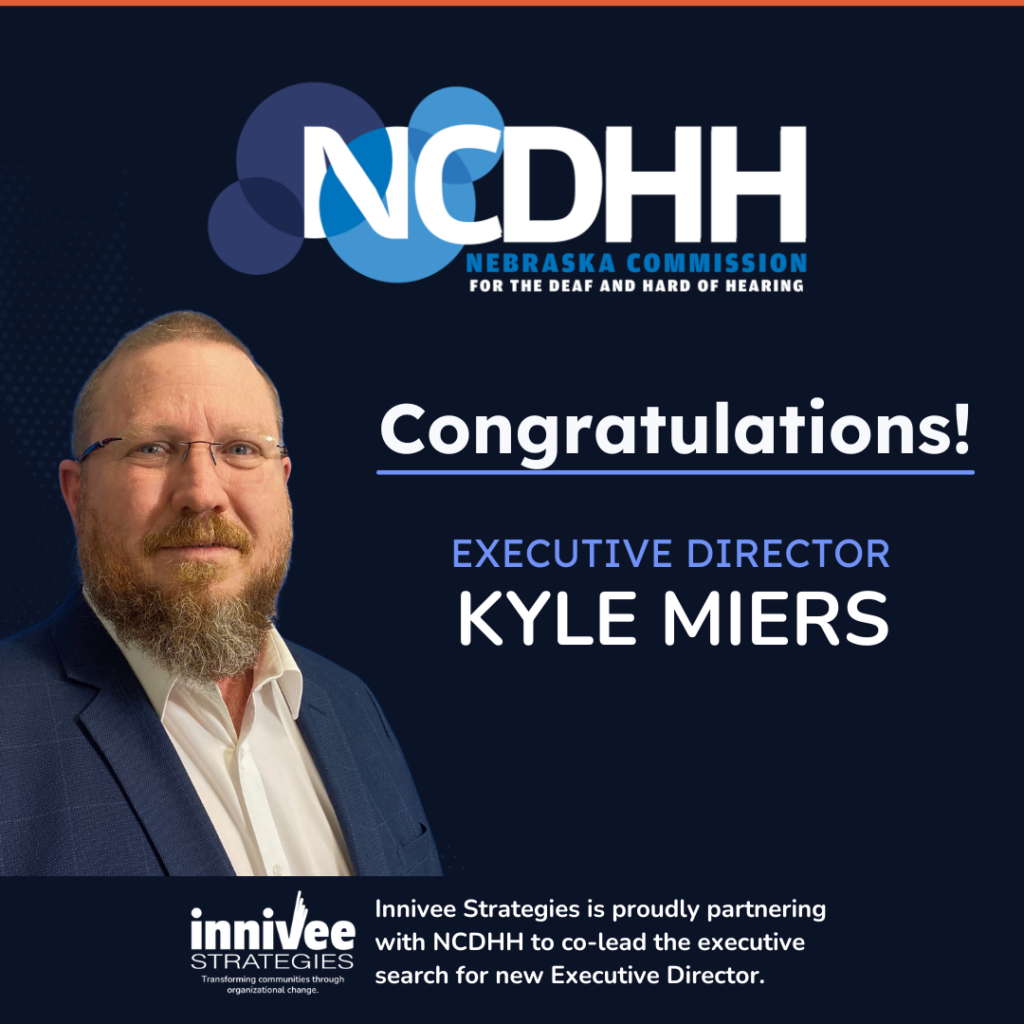It’s time to find a new leader. How do you begin?
The “tried and true” search process for a new leader is not enough, especially if it is an executive-level position such as CEO, Superintendent or other leadership within an organization serving a diverse or niche community such as the Deaf, DeafBlind, Hard of Hearing, Deaf+, and DeafDisabled (“Deaf”) communities.
Now, more than ever, underrepresented communities demand organizations who can build an equitable future for all members. A large part of that is establishing authentic leadership to relate to and represent their stakeholders. However, conventional search processes are not set up optimally to develop a strong vision about the leader, a fair vetting process, or to build mutual trust between the candidates, the community, and the organization and its people.
Our company, Innivee Strategies, Inc., is in its third year of leading executive searches for schools and organizations serving the Deaf and Hard of Hearing community. We provide this service because we have seen the repeated challenges that traditional search processes present. These obstacles include: cultivating a diverse and qualified talent pool, obtaining stakeholder buy-in on the search process and chosen candidate, and garnering support for new leader’s post-hire success and retention.
Below, we outline why a successful search depends on an intentionally-designed process driven by stakeholder engagement.
The Lived Experience
Innivee Strategies believes that the community is only as strong as the organizations that support it. Through enhanced board governance, empowered leadership, well-defined strategic plans, and effective executive search services, organizations and their leaders can better serve their communities.
We have met many incredibly talented and diverse Deaf, DeafBlind, and Hard of Hearing individuals with the power to create a better future for our community. However, systemic barriers have prevented these individuals from receiving the opportunity to grow into a leadership role. For example, conventional search processes that rely on “standard” benchmarks, criteria, and processes automatically eliminate potential and promising candidates on the basis of ‘not being qualified enough’. We innately understand that the best way to serve our respective community is to have a leader who understands and relates to our lived experience. Rarely, however, do organizations design their leadership search process to uphold these same values.
Looking for Skilled Leaders, Not Leaders’ Skills
Inequity is frequently baked into the leadership recruiting and hiring process – starting with the job description. Organizations frequently establish criteria that screen out candidates based on what they don’t have, rather than what they do. For instance, criteria often give more weight to a Master’s degree than lived experience, more credence to specific work experiences than the ability to forge powerful community relationships, more emphasis on what the candidate has accomplished in the past than their vision for the future.
For example, in an executive search at a Deaf organization led by a hearing, non-signing executive search consultant, the process prioritized CEO candidates who had experience leading and managing organizations with $25 million in revenue. This single qualifier excluded many Deaf leaders or prospective leaders, because the annual revenue of the majority of nonprofit organizations that exist within the Deaf community have budgets far less than $25 million dollars. The size of a budget, even if a factor to consider, still does not alone determine the effectiveness of a leader or their ability to do the job well, learn new skills, and uphold the community’s trust.
A recent Brookings article makes a similar point, arguing that we must stop evaluating potential candidates from a deficit lens, lest we perpetuate racist complex. The authors state that, “Due to racial segregation and stunted access to professional networks, many talented Black, Latino or Hispanic, and Indigenous workers never get a real opportunity to compete for key jobs in the emerging economy.” The observations of these authors can also be applicable to Audism and other challenges experienced within the broader Deaf community, especially other forms of isms for the intersectionality marginalized in the Deaf community.
In another example, careful consideration must be made in regards to years of experience. Every year of experience required from a candidate limits an organization to past, rather than future potential. It’s impossible to go back ten or fifteen years in time to populate more organizations with diverse leadership. What is possible is to seek out transferable skills, knowledge, and experience, and invest in tomorrow’s leaders, today.
Given the racist, sexist, and audist practices perpetuated by what is considered the “standard” approach to finding, hiring, and assessing the merit of candidates, it is time for change. Transforming our initial expectations of what a leadership candidate should bring to an organization will allow more individuals who are BIPOC, Deaf, disabled, and/or represent other intersectional identities to make it through the initial screening process and beyond.
Our experience has taught us that organizations must look for who can become leaders, rather than a narrow focus on specific knowledge and skill set. Rather than eliminating candidates because they lack skills, degrees, or sufficient years of experience, organizations should identify transferable experience, mindsets, and aspirations within the pool of applicants – and assess their alignment with the organization’s community, goals, and direction.
For Us, By Us
Changing what criteria organizations use to evaluate leaders is only the start. A successful search also hinges on an active and critically conscious recruitment process. A passive leadership search, such as posting a job description online and waiting for people to apply, will produce the status quo. Frequently, only individuals actively seeking a job will apply, and many talented candidates who are currently employed elsewhere may never see the posting, consider a career change, or think of themselves as leadership material. Additionally, candidates from minority groups are often wary of taking on greater responsibilities without assurance that they will be supported as leaders, and validation that they will not be pigeonholed into being the representative of an entire community.
In a world that frequently defines us by what we are not, it’s more important than ever to remind people of who they are. The many candidates from our search processes were individuals who, at first, had never even considered the role that we recruited them for. Getting to this point requires ongoing, and at times vulnerable, conversations with prospective candidates about the experience and perspective they bring, why they are a good fit for the role, and what they, themselves, wish for their future. Many of them were recommended by other community members who admired these individuals as leaders. In most cases, it took knowing that, along with careful consideration, before these individuals were ready to throw their hat in the ring.
In addition to actively engaging prospective candidates and seeking recommendations from varied stakeholders, it remains absolutely vital to include the community throughout the search and selection process. Carrying out the process without key stakeholder engagement implies that the ultimate decision will be made for the community, rather than with them. Without these community members present in the room and sitting at the interview table, potential candidates, who may also be members of the same community, will not feel valued, and nor will the community feel fully vested in the process.
External Expertise ≠ Experience
Bringing on an external consultant can help improve the leadership search and hiring process, but not all consultants are created equal. Although countless consultants possess leadership search experience, a crucial factor for success is to also have an innate understanding of the community they serve. Innivee Strategies has carried out executive search in the Deaf community.
Sometimes a hearing consultant would consider a candidate’s Deafness something to be benevolently overlooked or feel the need to demonstrate their competence in understanding a candidate’s lived experience. This is a missed opportunity to look for a transformative worldview and skillset. In one executive-level interview I experienced, a hearing non-signing search consultant took nearly 15 minutes to share their delight and marvel at taking ASL classes. Rather than establishing their credibility, this experience only emphasized how much the consultant had still to learn. Had it been a consultant who did not feel the same need to “prove” themselves, far less valuable time would have been taken away from me.
Consultants, too, must be able to design an executive search and hiring process that is designed right, from the start. Most leadership search processes last six months to one year, but even with a full breadth of knowledge about traditional search processes, it is impossible to understand and appreciate the complex dynamics, culture, and nuances of Deaf stakeholders within this short timeframe. This is where, once again, lived experience carries more weight than credentials or experience.
Search Smarter, Not Harder
It is inexcusable to claim that there are not enough Deaf, BIPOC, or other minority leaders who meet the standards or expectations for leadership roles. These assertions are short-sighted, convenient excuses that those with power and privilege use to absolve themselves of the effort and commitment required to seek and nurture the growth of minority leaders in the face of racist, audist, and discriminatory systems, policies, and thinking.
An intentionally designed search process will enable organizations to find candidates who bring lived experiences that resonate within their leadership, the community, and their vision. Involving stakeholders in the search process as decision-makers and drivers of the process improves the process for candidates while building community trust. Innivee Strategies, Inc. continues to seek ways to support organizations in their work to dismantle the systemic barriers keeping them from finding their next great leader and unlocking the future potential of leaders from within the communities that they serve.
Want to learn more about building the right process to find the right leader? Sign up for our email updates below:
[gravityform id=”6″ title=”false” description=”true”]







